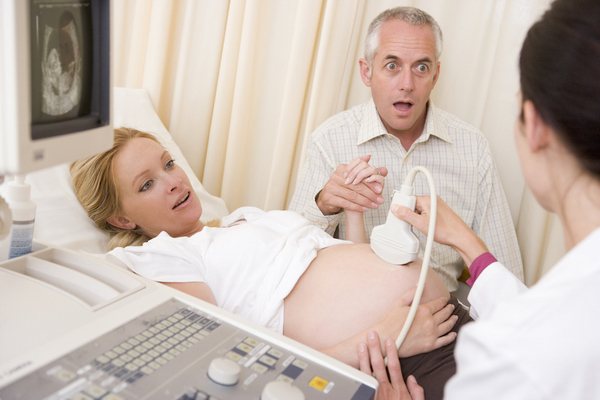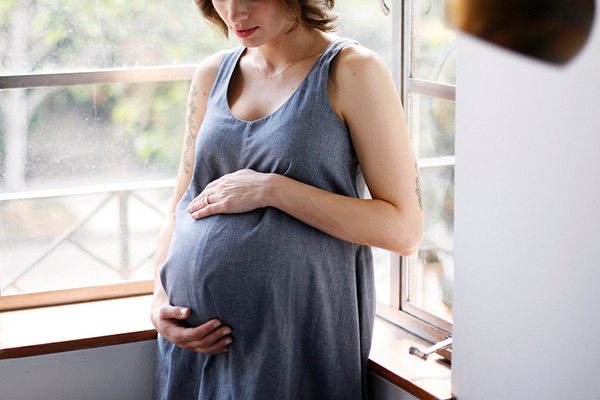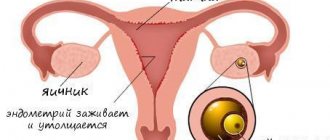What are the benefits?
Sometimes the benefits of having a child later in life can outweigh the benefits of having a child in your 20s or 30s.
- You are more prepared for motherhood and are moving towards it quite consciously.
- You may have already established your career and can devote more time to your child.
- You have a lot of life experience and will take a more mature and realistic approach to raising a child than young mothers.
- Your financial situation is most likely quite stable.
- You are convinced of the reliability of your partner, his ability to take care of you and the child.
Risks of late pregnancy
Thanks to technological advances in fertility, pregnancy and childbirth, it is quite possible to have a healthy baby by age 40. However, any pregnancy after 40 years of age is considered high risk. Therefore, your doctor should closely monitor you and the development of the fetus.
Risks of pregnancy after 40 years:
|
Late pregnancy | Pregnant at 40 | The joy of anticipation
Planning a pregnancy is a very important step for future parents. That is why conceiving and giving birth to healthy babies is the sacred duty of mom and dad. We have extensive experience when a conscious approach to pregnancy planning gives a guaranteed result. Why is it so important to take a competent approach to pregnancy planning? On the one hand, as practice shows, only 5 newborns out of 1,000 are practically healthy. What about the other 995 babies? They already have certain health issues at birth. On the other hand, proper pregnancy planning has a natural result - the birth of healthy children.
The pregnancy planning programs below were compiled by leading specialists with a huge amount of practical knowledge and skills.
| PREVENTIVE COMPLEXES WHEN PLANNING AND PREPARING FOR PREGNANCY using nutritional correctors | ||||
| Periods | Problems to be solved | Nutrition correctors | How to apply correctly and the amount of product per course | |
| I | Calming effect | Griffonia alternate with MindSet | 1 * 3 rub. 30 minutes before meals | 1 pack each |
| Adjusting the powerful immune response | Colostrum capsules | 1 * 3 times a day for 30 minutes. before meals | 1 package | |
| Antimicrobial effect, maintaining the balance of microorganisms in the gastrointestinal tract | Silver Max | Preventive or health dosages differ. | 1-2 bottles | |
| Mega Acidophilus alternate with SuperFlora | 1 capsule 3 times a day after meals | 1 bottle each | ||
| II | Targeted improvement of metabolic processes | Balanced food for every day - "Prenatal" | Cocktail | 1 package for 1 month |
| Digestive enzymes: Alternate DigestAble with Assimilator and Papaya | 1 * 3 times a day with meals. Papaya – suck after eating. | 1 bottle each | ||
| Increased blood oxygen saturation | Coenzyme Q10 | 1 * 2 r. in 30 min. before meals. | 1 bottle | |
| III | Increasing resistance at the cellular level from aggression of viruses, bacteria and other types of parasites | Black Walnut Leaves | 1 * 3 times a day 30 minutes before meals | 1 package |
| Ant tree bark | 1 * 3 times a day 30 minutes before meals | 1 bottle | ||
| Normalization of vitamin and mineral balance with natural products of the Coral Club | Complex 24/7 | 2 * 3 times a day 30 minutes before meals. | 1 package | |
| When planning a pregnancy after the Coral Detox program, the ideal option is: 4 (four) Kolo Vada per year with three-month recovery periods. At all stages of recovery, it is advisable to use Folic acid, Coral Lecithin, Coral Alfalfa, alternate with Protiviti and the “green table at home” - Spirulina, Omega 3/60 alternate monthly with Omega 3,6,9. When planning and preparing for pregnancy, an excellent result is achieved against the backdrop of Coral water and the antioxidant H-500. Calcium Medzhik is well suited to replenish calcium deficiency from the first to the eighth month of pregnancy. Well, nutrition accordingly - a lot of greens, fruits, vegetables. Remove GMO products, food (flavor, color, smell enhancers). | ||||
Children born after parents used a pregnancy preparation program using Coral Club nutrition correctors.

It remains to wish you to make a wise, informed decision to become happy parents. You can purchase products for pregnancy planning and ask questions to a specialist here.
RELATED ARTICLES ABOUT HEALTH:
| Effective cleansing of the entire body in 14 days 10 advantages of the Colo-Vada program that distinguish it from other body cleansing programs | Menopause is a new period in a woman’s life. We present a new unique product “FitoMix for Women”, which has already won the hearts of the weaker half of humanity. |
| Parasites – the plague of the 21st century? Among the seven billion 300 thousand people living on Earth, more than 4.5 billion adults are infected with parasitic diseases... | 41 reasons why sugar is bad for your health. As medical practice shows, granulated sugar is one of the most dangerous substances in our home. Why is this so? Global popularization... |
Possibility of getting pregnant after 40
One study found that couples who have regular unprotected sex will become pregnant within a year:
- about 7 in 10 women aged 30;
- about 6 in 10 women aged 35;
- about 4 in 10 women aged 40.
After 40 years of age it becomes increasingly difficult to get pregnant. But advances in fertility have been the driving force behind the increase in the number of women expecting children.
Some available options include:
- modern infertility treatment,
- ECO,
- freezing eggs at a young age to use them later,
- sperm banks,
- surrogacy.
But even with the use of auxiliary methods, a woman’s ability to conceive decreases significantly after 35 years. According to statistics, a third of couples after 35 years of age experience problems conceiving and bearing a child.
This is due to the fact that with age:
- fewer eggs are capable of fertilization,
- unhealthy eggs
- the ovaries do not release eggs properly
- increased risk of miscarriage,
- diseases that interfere with fertility have appeared.
The number of eggs (oocytes) decreases significantly after 35 years. According to experts, their number decreases from 25,000 at the age of 37 to just 1,000 at the age of 51. During puberty, a girl has between 300,000 and 500,000 oocytes.

How to prepare for late childbirth?
Among the features of childbirth that end late pregnancy, the main possible difficulties can be identified:
- The need for a caesarean section.
- Weakness of labor.
- Bleeding
due to problems with the placenta. - Ruptures of the soft birth canal
.
That is, preparation for childbirth should include a full examination
, if there is a threat of miscarriage -
timely hospitalization
, identification and treatment of all diseases, control over your health, giving up bad habits, gymnastics for pregnant women and, most importantly, your positive attitude.
The website warns: the information is provided for informational purposes only and does not constitute medical advice. Do not self-medicate under any circumstances! If you have any health problems, consult your doctor!
The priorities of a modern woman have changed significantly over the past 10 years. She is building a career, engaged in self-knowledge, proving to the whole world that she is able to solve any problem. All this could not but affect one of the most important functions of her body - childbirth. Today, young girls are increasingly putting off adding to their families “for later,” not realizing that late pregnancy is not only the joy of motherhood, but also a huge risk for their personal health and the health of the unborn baby.
Planning a pregnancy at 40
All women need to take care of their reproductive health. And if you are over 40, then you need to pay more attention to your health. To minimize the possibility of risks during pregnancy and childbirth, follow a few simple tips.
Take prenatal vitamins
Look for vitamins that contain 400 mcg (0.4 mg) of folic acid. Start taking them before you become pregnant. This will help prevent some birth defects in your unborn baby (such as spina bifida).
Consult your doctor frequently
Get checked regularly. When planning a late birth after 40 years of age, undergo a full examination. Ask your doctor to help you choose the best vitamins for you. Consult with specialists if you have any questions about the progress of your pregnancy.
Check your chronic disease status
Make sure your chronic conditions are under control (such as diabetes or high blood pressure). Tell your doctor that you are planning a pregnancy, especially if it is a late first pregnancy, so that your doctor can adjust your treatment based on this fact.
Check your weight
If you have problems with excess weight, start sticking to a diet. Pregnant women who are overweight are more susceptible to various problems during pregnancy and childbirth.

Review your diet
Pay more attention to what you eat. Your daily diet should be as varied and nutritious as possible. It is especially important that you consume enough folic acid.
Exercise regularly
Before pregnancy, get your body in order. Start playing sports. You can exercise at home, but if you can’t, go to a nearby fitness center.
You should have enough time for sleep and rest
It is very important to get enough sleep. If you sleep 8 hours or more but still feel tired, tidy up your bedroom. The TV, phone and laptop may need to be put away. During sleep, the body must rest.
Avoid alcoholic drinks and cigarettes
Drinking alcohol and smoking, even in the early stages of pregnancy, increase the likelihood of miscarriage and can also seriously undermine the health of the unborn baby. It is better to abstain from alcohol in the second half of the menstrual cycle. This is the time when ovulation occurs and the likelihood of getting pregnant increases.
Avoid or reduce stressful situations
Research by scientists shows that stress can lead to a lack of ovulation or a complete period, which naturally delays pregnancy.

Why doesn't it work?
The process of conceiving can take some time, regardless of age. But if you're over 40 and have been trying to have a baby for 6 months without success, it might be time to see a family planning specialist.
Your doctor will do tests to determine if there are factors that may affect your ability to get pregnant. These may include an ultrasound to look at your uterus and ovaries, or blood tests to find out the functional reserve of your ovaries.
According to statistics, most women after 45 years cannot become pregnant naturally.
Alternative methods of conception
If you are having trouble conceiving, talk to your doctor about alternative options to see if any are right for you.
The most common:
- Hormonal drugs for infertility. They stimulate the ovaries, promoting successful ovulation.
- In vitro fertilization (IVF). Fertilization of the egg in the laboratory and subsequent introduction back into the uterus. This method is suitable for women who have problems with ovulation and for surrogate mothers. According to some reports, women between the ages of 41 and 42 have a success rate of 11%.
- Intrauterine insemination (IUI). This process, also called artificial insemination, works by introducing sperm into the uterus. Most often used for male infertility.

Marina Mogilevskaya
Gave birth to a daughter at 41

The star of the TV series “Kitchen” Marina Mogilevskaya admitted that from the age of thirty she was obsessed with the idea of having a daughter. The birth of a child was constantly postponed: either there was no time, or there was no suitable man nearby. The actress said that as soon as she decided to stop worrying and let go of the situation, she found out about her pregnancy. Mogilevskaya gave birth to a daughter, Masha, from a man whose name she prefers not to name.
“Do I regret that I gave birth at forty-one and not at twenty? No, not for a second. Everything has its time. Only by the age of forty did it become more or less clear to me what I was like, what I could and wanted to give to my child, unnecessary ambitions disappeared somewhere, I stopped proving something to someone.”
Features of late pregnancy
Just like the ability to get pregnant after 40, pregnancy itself can become more difficult as you age.
Older pregnant women often complain of pain in joints and bones, which lose their strength with age. They are also more susceptible to high blood pressure and gestational diabetes. Even pregnancy-related fatigue may become more severe as you age.
Talk to your OB/GYN about what else you can expect during pregnancy, depending on your age and overall health.
Childbirth in women after 40
Natural childbirth is unlikely after 40 years of age. This is primarily due to infertility treatments, which increase the risk of induced preterm birth. A woman may also be at increased risk of preeclampsia, which may require a caesarean section to save both mother and baby.
If you decide to have a natural birth at the age of 40, you should know that it will be more difficult. In addition, there is a high risk of stillbirth.
Many women successfully give birth to healthy children aged 40 years and older. Talk to your doctor about what to expect and have a backup plan. For example, if you plan to have a vaginal birth, talk to your partner and family about what help you will need if you do need a caesarean section.

Monica Bellucci
She gave birth to her first daughter at 39 years old, and her second at 45 years old.

Important events in Monica Bellucci's personal life took place in September, shortly before her birthday. In 1999, on the eve of her 35th birthday, the actress married actor Vincent Cassel. Five years later, a couple of weeks before her fortieth birthday, Bellucci gave birth to a daughter, Virgo, and at 45, a daughter, Leoni.
Monica has an ambiguous attitude towards late childbirth: “Women who give birth late, like me, like to say how brave they are. This is true, because the older you get, the greater the risk for you and the child. But personally, I don’t consider myself brave, I consider myself lucky. When I gave birth to my first child at 39, I said that I wanted a second child as soon as possible, but I was not ready for this in reality. Children are not films and do not tolerate fuss and haste in preparation for their arrival.”
Some more opinions from doctors
For some women, pregnancy at 40 may not occur immediately. However, your fertility specialist will need to take action quickly as birth rates drop sharply after age 40.
If you are unable to get pregnant naturally, you should consider whether you are willing to undergo multiple attempts at fertility treatment and whether you have the funds to cover this treatment.











